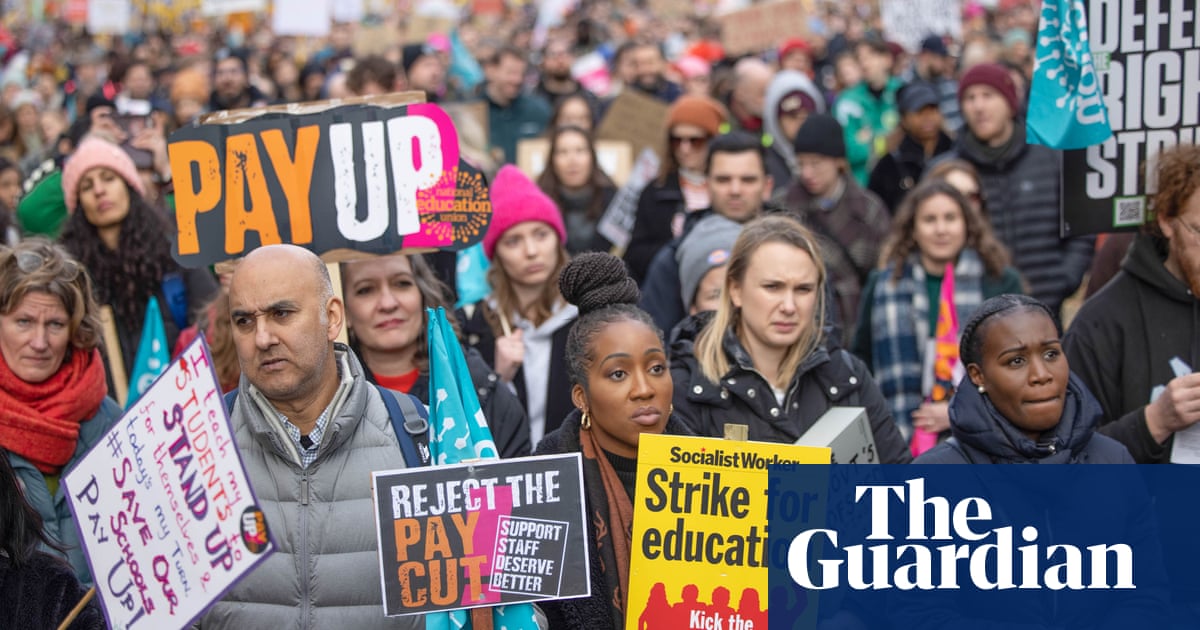
As workers across the UK prepare for strike action over pay, it has emerged that 2022 has been the worst year for real wage growth in nearly half a century.
Analysis of official statistics by the Trades Union Congress (TUC) found that real wages – the amount people earned in relation to their cost of living – fell by an average of £76 a month in 2022 as a result of pay not keeping pace with inflation.
Key workers in the public sector are now £180 a month worse off in real terms than they were a year ago, it said.
It means workers have seen the sharpest fall in real wages since 1977 and the second worst on record since the end of the second world war. It also explains why so many workers have either started or are about to strike for increased pay.
In the coming days strikes by postal workers, train and bus drivers, border force agency staff, driving instructors, NHS workers, teachers and a host of others are set to cause huge disruption across the UK.
Nurses’ real pay fell by £1,800 over the last year, while paramedics’ real pay fell by £2,400, according to the TUC. Nurses, who are due to strike on Thursday, are earning £5,000 a year less – in real terms – than they were in 2010. And for midwives and paramedics the figure rises to more than £6,000.
The TUC general secretary, Frances O’Grady, said the current wave of industrial action in Britain is the result of workers “being pushed to breaking point” by years of pay austerity. She also accused ministers of being more interested in escalating disputes than resolving them.
“Family budgets have been shredded by soaring bills and more than a decade of pay being held down. The Conservatives have presided over the longest real wage squeeze in over 200 years,” she said.
“The Tories’ failure to get pay rising has left millions of households brutally exposed to the cost of living emergency. It’s time to reward work – not wealth. We cannot be a country where NHS and teaching staff have to use food banks , while City bankers are given unlimited bonuses.”
Amid soaring household and other costs, workers have faced food inflation running at over 12% and annual energy bills more than £1,000 higher than last year. Despite this, ministers have been actively blocking pay offers by employers – in the case of the rail dispute – or refusing to intervene in others.
On Sunday, the foreign secretary, James Cleverly, rebuffed an offer by nursing unions to suspend planned strikes in return for negotiations on pay. Nurses, whose pay starts at £27,000, have demanded a 17.6% pay rise, dismissed as unaffordable by ministers who themselves earn in excess of £150,000 a year.
The union body said it was “nonsense” to claim that raising wages would hike inflation and that any serious plan for improving growth must involve putting more money back into workers’ pockets.
A government spokesperson said: “We are increasing the wages of millions of workers by raising the ‘national living wage’ to £10.42 an hour in April – an extra £1,600 a year for a full-time worker.
“On top of this, the energy price guarantee will save a typical household around £700 this winter, whilst we have reversed the rise in national insurance contributions and made changes to universal credit to help working households keep more of what they earn.
“It is vital we bear down on inflation, which is eating away at people’s wages, however we also recognise the vital contribution the public sector makes to our country, which is why we have offered 2 million workers the highest pay uplift in nearly 20 years.”












